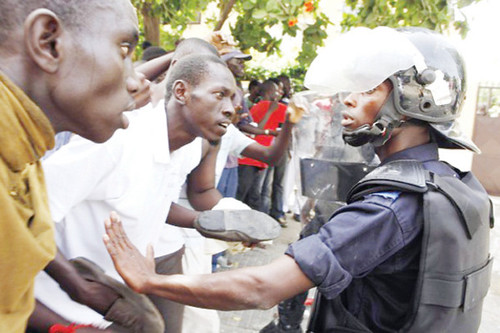
The masses in the West African state of Senegal have demonstrated demanding the ouster of President Wade. The unrest has developed over the last several months., a photo by Pan-African News Wire File Photos on Flickr.
Wednesday, Feb. 22, 2012
Nigeria's Ex-Leader Mediates in Senegal
By AP / RUKMINI CALLIMACHI
(DAKAR, Senegal) — Former Nigerian President Olusegun Obasanjo, who is officially in Senegal to observe this weekend's contentious election, met opposition candidates Wednesday in an effort to mediate a growing political standoff in this normally peaceful nation.
The retired leader, who has helped mediate conflicts elsewhere in Africa, had told reporters upon his arrival Tuesday that Senegal "is a very beautiful country and nothing should be done to destroy it."
Senegal is tense and an air of uncertainty blankets the capital with just five days to go before Sunday's presidential election. Businesses on the main commercial avenues surrounding the presidential palace are boarded up and pieces of plywood cover shop windows as if a hurricane is about to pass through town.
Daily protests have rocked the capital after the opposition vowed to render the country ungovernable if 85-year-old President Abdoulaye Wade runs for a third term on Sunday. Wade has been dismissive, characterizing the protests as nothing more than a "light breeze which rustles the leaves of a tree, but never becomes a hurricane."
He has insisted that he still has a strong following, and to prove his point Wednesday he held a campaign rally in front of thousands of people at a soccer stadium in Pikine, a downtrodden suburb of Dakar that is an opposition stronghold.
"Pikine has already massively voted in favor of its candidate," he said, as the crowd cheered and held up signs that said "Wade Forever."
"I have toured practically all of Senegal. And everywhere, I was received with this same enthusiasm ... Without a doubt, we will win," he added.
Senegal is considered the most stable in the region, but many people are now worried because the pace of the protests is unlike anything it has experienced in years. Senegal's democratic traditions run deep, with historians dating its democracy to at least the mid-1800s when France allowed citizens of the former colony to elect a deputy to the French parliament.
Obasanjo is officially in Senegal as the head of an election observation mission sent by the African Union and a regional bloc representing states in West Africa. But since leaving office in 2007, he has become one of Africa's high-powered mediators. At the airport Tuesday he told reporters that he would not hesitate to help mediate a solution in order to "prevent the preventable."
Among the opposition leaders Obasanjo is meeting Wednesday is Wade's former protege, ex-Prime Minister Idrissa Seck, who is now running against the leader.
Earlier this week, Wade's spokesman Serigne Mbacke Ndiaye called a press conference to disclose that authorities had discovered that one of the 13 opposition candidates had recruited a personal militia with the aim of sowing unrest ahead of the vote.
Senegalese newspapers identified the candidate as Seck, even though Seck called the accusations absurd. Unlike the other candidates, Seck's bodyguards wear ski masks over their faces with cutout holes for their eyes and mouth. They wear a black uniform, giving them a paramilitary look.
Some opposition candidates are calling for Sunday's vote to be postponed in light of the unrest, and anti-government demonstrators could try to disrupt the vote in polling stations to stop Wade from running.
From there it would be a slippery slope, if the recent election in Congo is any indicator. Election day violence in Congo last December resulted in ballots being burned and poll workers attacked.
Wade's spokesman said Wednesday that delaying the election is out of the question. He also said that Obasanjo is here to monitor the vote, and that he is not aware of a different reason for his visit.
"We're happy that Obasanjo has arrived in Dakar, but we are not aware of any mediation. Wade asked the international community a year ago to come and observe the election, and it is within this framework that he is here," said Ndiaye. "If he wants to meet, it's within the African tradition. If he thinks he could or should meet Wade, he can do so."
Obasanjo is also meeting with M23, a coalition of opposition groups which takes its name from the massive anti-government protests that immobilized the capital last June 23.
The M23 said in a statement that they are calling on the international community to do what it can to prevent Wade from running in Sunday's poll. Even though Senegal has one of the most established democracies in the region, people fear that the ruling party will try to rig the vote so that Wade wins.
Associated Press writer Thomas Faye contributed to this report from Dakar.
No comments:
Post a Comment